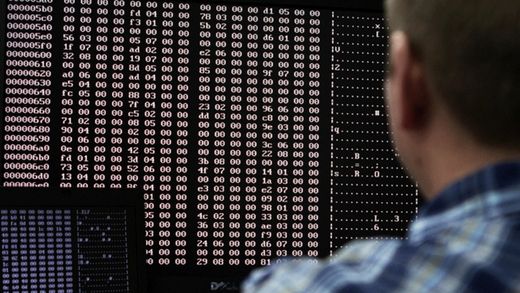
© Jim Urquhart/ReutersAn analyst looks at code in the malware lab of a cybersecurity defence lab at the Idaho National Laboratory. Computer viruses, such as the recently identified Flame worm, are being increasingly used as tools of state espionage.
A new kind of malware that is more sophisticated and damaging than the notorious Stuxnet and Duqu worms is
likely being deployed by a nation state, say the cybersecurity firms that uncovered it.
"Duqu and Stuxnet raised the stakes in the cyberbattles being fought in the Middle East, but now we've found what might be the most sophisticated cyberweapon yet unleashed," wrote analyst Alexander Gostev in a
blog post on the website of Kaspersky Lab Monday.
Moscow-based Kaspersky Lab, Budapest-based
Laboratory of Cryptography and System Security (CrySysLab) and Iran's Maher Computer Emergency Response Team Co-ordination Centre (CERTCC) have all independently uncovered the Trojan while investigating widescale cyberattacks.
The worm, which has variously been dubbed Flame, Flamer or SkyWiper, is able to mine a vast array of data from infected machines by:
- Surveying network traffic.
- Taking screenshots, including in instant messaging programs.
- Recording audio conversations via a computer's internal microphone.
- Collecting passwords.
- Intercepting keyboard actions
- Gleaning information from devices connected to the infected machine by Bluetooth.
- Scanning hard drives for specific file extensions or content.
- Transmitting data to servers that control the malware
"Flame is one of the most complex threats ever discovered," Gostev wrote.
It far surpasses Stuxnet and Duqu, two worms behind cyberattacks against technology related to Iran's nuclear energy program, both in size - the program used to deploy it is 20 MB versus about 500 KB - and in its capability to steal information in so many different ways.
"It's a complete attack tool kit designed for general cyber-espionage purposes," writes Gostev.







Comment: 6 million deaths by the time of this talk in the early 1990s. 3,000 major operations and 10,000 minor operations by the early 1990s.
To that list we can now add the Global War on Terror (Iraq, Afghanistan - again, Yemen, Honduras - again, Syria, Iran, Pakistan... and so on).
Ever since they got to Kennedy first before he could carry out his intention to "break the CIA into a thousand pieces", this diabolical organization, in partnership with fellow psychopaths in the Mossad, has started just about every war and fomented every coup d'état in its megalomaniacal quest to rule the world.